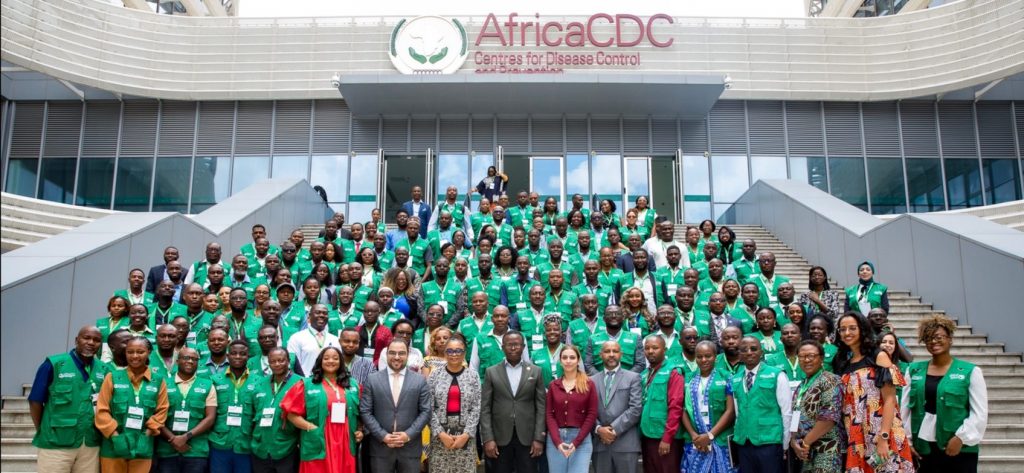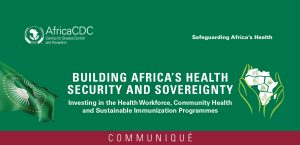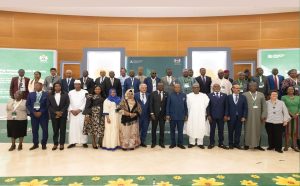They are trained, equipped, and programmed to save lives during outbreaks. They are a human shield designed to stop the spread of infections on command.
The passionate African Volunteers Health Corps (AVoHC), a network of African medical and public health professionals, was forged in June 2015 as an antidote to help neutralize the spread of Ebola in Guinea, Liberia, and Sierra Leone.
Ebola had shown its brutal side. Adequate health workers were scarce. Drugs were not easily accessible. People were dying in large numbers without help. A solution lay in human solidarity.
The inaugural team of doctors, nurses, paramedics, social scientists, psychosocial specialists, laboratory scientists, communications professionals, logisticians, data managers, physicians, and epidemiologists were the creation of the African Union Mission to Ebola Outbreak in West Africa (ASEOWA).
“The health emergency workforce was born out of the lessons learnt from the Ebola mission, and established as a standby force readily available for health emergencies in Africa,” said Dr. Radjabu Bigirimana, Program Lead, African Volunteers Health Corps. “When Africa CDC was launched in 2017, it took over and materialized the decision to establish an emergency workforce by the Heads of State,” he added.
“This is one of the great initiatives that we have in Africa CDC,” said Dr. Wessam Mankoula, Regional Director, Northern Africa RCC and Head of Emergency Preparedness and Response Division at the Africa Centres for Disease Control and Prevention (Africa CDC).
An initial pool of 800 volunteers was deployed in West Africa and formed the first database of AVoHC. But when Africa CDC conducted a training needs assessment, one in four respondents said they were not ready to be deployed at that time.
“We then decided to come up with a competency-based curriculum to train these experts, so that they are competent and equipped with skills required for an effective emergency response,” said Dr. Bigirimana.
Africa CDC, working with partners, designed and developed the AVoHC induction course to address the skill gap and ensure all AVoHC members are fully prepared for efficient and effective deployment during a health crisis. The comprehensive course was piloted and validated in 2022, and its content was refined to meet the specific needs of health responders across the continent.
Level 1 focuses on soft skills or adaptive technical competencies, Level 2 is geared towards technical competencies, and Level 3 on team leadership competencies.
Since its launch, 154 AVoHC members have successfully completed the training, equipped with the critical skills and knowledge needed to contribute to public health emergencies and strengthen response efforts throughout the continent. Following the successful recruitment of 385 epidemiologists from various Member States across the continent, Africa CDC plans to accelerate the rollout of the AVoHC induction course in 2025.
In March, 120 rapid responders gathered at Africa CDC headquarters for a five-day induction course, bringing the total AVoHC Rapid Responders trained to 274.
To continue training responders, AVoHC must weather some operational storms. Some of the challenges include funding and sustainability. “Having this wide-ranging team of well-trained experts is costly. So, training and retaining groups costs a lot of resources. The costs of deploying our responders are also high,” said Dr. Wessam.
The training needs to be standardized as the responders cover 55 African countries with different languages, cultures, and health systems, making it easier for them to embed into local systems, said Dr. Wessam.
Considerations and preparations must also be made to ensure the safety and security of this special group. “It is very challenging sometimes when you are deploying a team to a public health emergency under political instability, so investments in security and proper coordination with our Peace and Security Department, the African Union, and the United Nations security team are required to ensure the safety of our responders,” he said.
While challenges threaten to overwhelm the existence of AVoHC, the initiative is thriving, starting its work under proper continental and regional coordination. The support of different partners, including the World Health Organization and UK Health Security Agency, is guiding the expansion of AVoHC to meet growing demand from Member States. “We are targeting to respond within 48 hours once we receive a request from Member States,” said Dr. Wessam.
“Our target for the future is to expand AVoHC not only in public health expertise but also emergency medical teams to include nurses, clinicians, and case management specialists for the different emergencies we are facing on the continent,” he added.
Africa CDC is continuously mobilizing resources to ensure the existence of a well-trained health workforce. Once recruited, AVoHC members are given an induction course that also explains the mandate of Africa CDC to enable deployment. In between deployments, members are given refresher courses.
“So far, we have been able to recruit, but we still have a lot of work to do in reaching out to Member States about what AVoHC is and its work,” said Dr. Ahmed Tijani Abubakar, Emergency Preparedness and Response focal point for the Northern Africa RCC and AVoHC activities coordinator.
No AVoHC teams have been deployed in North Africa yet, but with the new recruitment, Africa CDC looks to get more volunteers who understand the role of the initiative in Africa.
“AVoHC serves as a good career opportunity. It builds an expert platform for knowledge sharing among health professionals,” said Dr. Abubakar. Even countries will have a pool of trained experts who can easily be deployed at short notice in the event of an outbreak. “This saves time on recovery before other international experts come in to support the members. AVoHC plays an important role,” he said.
Considering emergencies and preparedness need to be handled in a coordinated manner across the African continent, there are several practical and strategic activities that WHO AFRO and Africa CDC can implement together to enhance response at the country level, said Dr. Ishata Nannie Conteh, a public health expert with the Continental Incident Management Support Team (IMST) from the WHO African Region.
Dr. Conteh said that joint planning of the emergency workforce can be done countrywide, and AVoHC members deployed by Africa CDC can embed themselves into WHO workforce teams at the country level to collaborate effectively.
“We can do joint deployment of emergency responders by establishing clear deployment protocols where we can track the deployment,” she said. “We can develop a joint monitoring framework for the emergency workforce to track the impact of deployments in countries,” she added.
To strengthen partnership, regular meetings can be held to optimize resources in a particular country, Dr. Conteh suggested.
Dr. Samar Al-Mutawakeel, Emergency Lead for Emergency Health Workforce with the WHO Eastern Mediterranean Regional Office (EMRO), said they began work with Africa CDC in 2022 on the Joint Emergency Preparedness and Response Action Plan (JEAP), which aims to strengthen the health workforce on the African continent.
“Having seven African countries in the EMRO region is the perfect platform to strengthen our collaboration on health workforce and research capacities to respond to multiple emergencies—from natural disasters to humanitarian crises and outbreaks—and to determine how we can deploy them at national, subregional, and regional levels,” said Dr. Al-Mutawakeel.
The priority is about strengthening leadership in the regions and empowering leaders’ networks and decision-makers “so that when there is an emergency, they can talk to each other in advance and align their strategic efforts and resource mobilization,” she said.
Dr. Claire Bayntun, Head of the Capacity Strengthening Pillar at the UK Public Health Rapid Support Team, who works with lower-resourced countries in outbreak response and has supported Africa CDC to develop training materials for AVoHC—including the curriculum and the facilitator’s manual—said they respond to outbreaks when countries invite them.
“This is one of the most valuable assets that Africa CDC has offered to the African continent to support outbreaks,” said Dr. Bayntun. She said she is looking forward to the strategic future of AVoHC. For 2025, Africa CDC plans to train 255 AVoHC members, including 126 Francophone and 129 Anglophone. Currently, AVoHC has 900 members on its roster. They target to grow the group to 2,500 members.







